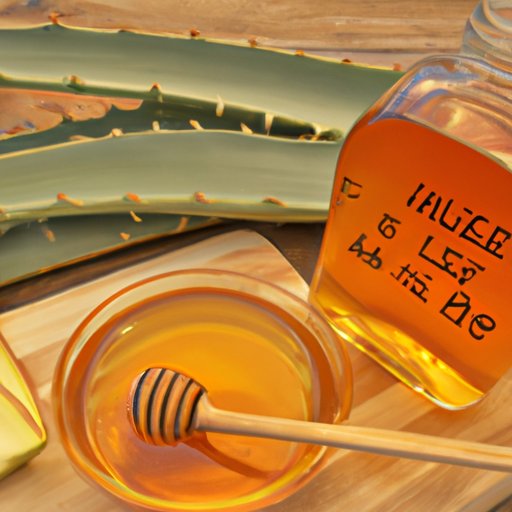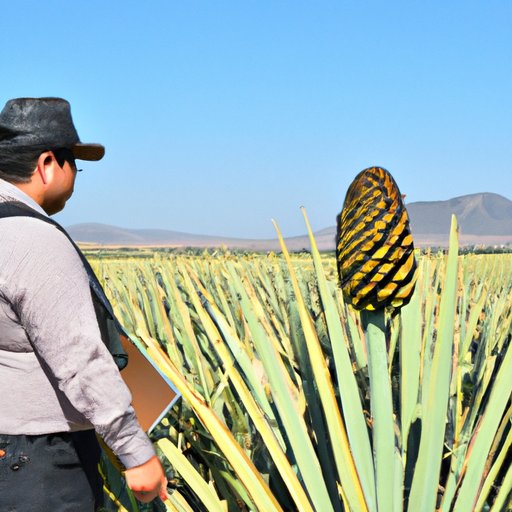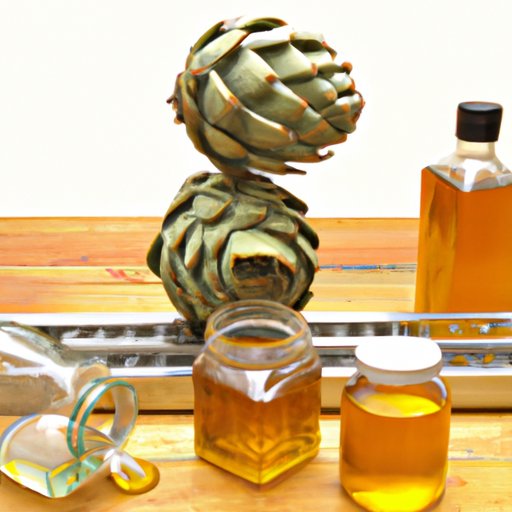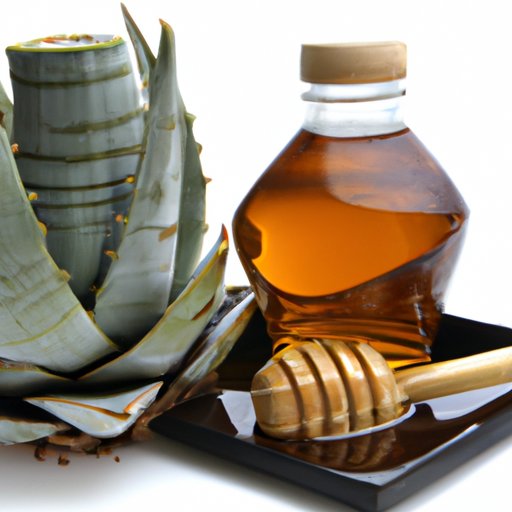Introduction
When it comes to sweetening foods and drinks, two of the most popular options are agave and honey. But how do they compare nutritionally? And which one is healthier? This article will explore these questions and more as we take a closer look at the pros and cons of agave and honey.

Comparing the Nutritional Benefits of Agave and Honey
Agave and honey are both natural sweeteners derived from plants. While agave is made from the sap of the agave plant, honey is produced by bees from the nectar of flowers. Both of these sweeteners provide some beneficial nutrients, but their nutrient profiles vary slightly. Here’s what you need to know about their calorie and carbohydrate content, protein and fiber content, and other nutrients.
Overview of Nutrients in Agave and Honey
Agave and honey both contain trace amounts of vitamins and minerals, including vitamin C, calcium, iron, and potassium. However, the amounts of these nutrients are very small and not considered significant sources of these nutrients. Honey also contains some B vitamins, such as thiamin and riboflavin, while agave does not.
Examining the Calorie and Carbohydrate Content of Agave and Honey
Both agave and honey are high in calories and carbohydrates. A single tablespoon of agave contains 60 calories and 16 grams of carbohydrates, while a tablespoon of honey has 64 calories and 17 grams of carbohydrates. However, agave has a much higher concentration of fructose than honey. Fructose is a type of sugar that is metabolized differently than other types of sugar, so it can have different effects on blood sugar levels. Because of this, agave may be the better choice for people with diabetes or those looking to control their blood sugar levels.
Evaluating Protein and Fiber Content of Agave and Honey
Agave and honey are both low in protein and fiber. A tablespoon of agave contains less than 1 gram of protein and no dietary fiber, while a tablespoon of honey contains 0.3 grams of protein and 0.2 grams of fiber. While neither of these sweeteners are major sources of protein or fiber, they can still contribute to your daily needs.
Exploring the Health Benefits of Agave Versus Honey
In addition to providing calories and carbohydrates, agave and honey may offer other health benefits. Let’s take a look at the potential benefits of each sweetener.
Assessing Antioxidant Properties of Agave and Honey
Antioxidants are compounds that help protect the body from damage caused by free radicals. Free radicals are unstable molecules that can cause oxidative stress, which is linked to several chronic diseases. Agave and honey both contain antioxidants, although the amount varies depending on the type of agave or honey. Studies have shown that both agave and honey can reduce oxidative stress and inflammation.
Investigating Anti-inflammatory Effects of Agave and Honey
Inflammation is a normal response of the immune system to injury or infection. However, chronic inflammation can lead to many diseases, including diabetes, heart disease, and cancer. Studies have found that both agave and honey can reduce inflammation, although the effect of honey appears to be stronger. Honey may also be more effective at reducing inflammation than agave.
Considering the Potential for Blood Sugar Regulation with Agave and Honey
Agave and honey may also help regulate blood sugar levels. As mentioned earlier, agave has a higher concentration of fructose than honey, which can help slow the absorption of sugar into the bloodstream. Studies have also found that honey can improve insulin sensitivity, which helps the body use sugar more efficiently. However, it is important to note that consuming too much of either sweetener can lead to elevated blood sugar levels.
Examining the Different Types of Agave Sweeteners
Not all agave sweeteners are created equal. The type of agave sweetener you choose can affect the flavor, texture, and even the health benefits. Here are the four main types of agave sweeteners:
Light Agave Nectar
Light agave nectar is made from the sap of the agave plant and has a mild, slightly sweet flavor. It is often used as a substitute for honey or sugar in recipes. Light agave nectar is lower in calories and carbohydrates than other types of agave sweeteners.
Dark Agave Nectar
Dark agave nectar is made from the same sap as light agave nectar, but it is boiled longer and has a darker color and stronger flavor. Dark agave nectar is higher in calories and carbohydrates than light agave nectar and is typically used as a syrup or topping for desserts.
Raw Agave Syrup
Raw agave syrup is made from the juice of the agave plant and has a thick, syrupy consistency. It is higher in calories and carbohydrates than other types of agave sweeteners and has a strong, earthy flavor. Raw agave syrup is best used as a topping or added to drinks.
Organic Agave Syrup
Organic agave syrup is made from organic agave juice and is certified organic. It has a milder flavor than raw agave syrup and is lower in calories and carbohydrates. Organic agave syrup is often used as a substitute for honey or sugar in recipes.

Deciphering the Pros and Cons of Agave and Honey
Now that we’ve explored the different types of agave sweeteners, let’s take a look at the pros and cons of agave and honey.
Advantages of Agave Over Honey
Agave has several advantages over honey. First, it is lower in calories and carbohydrates than honey. It also has a higher concentration of fructose, which can help slow the absorption of sugar into the bloodstream. Finally, agave is vegan-friendly, while honey is not.
Disadvantages of Agave Compared to Honey
The main disadvantage of agave compared to honey is its lack of nutritional value. While honey contains trace amounts of vitamins and minerals, agave does not. Additionally, agave has a higher glycemic index than honey, which means it can cause a rapid spike in blood sugar levels if consumed in large amounts.
Uncovering the Differences in Taste and Texture Between Agave and Honey
In addition to their nutritional differences, agave and honey also differ in terms of taste and texture. Here’s what you need to know about the flavors and textures of each sweetener.
Analyzing the Flavor Profiles of Agave and Honey
Agave and honey have different flavor profiles. Agave has a mild, slightly sweet flavor, while honey has a more complex flavor with notes of floral, citrus, and even spices. The flavor of honey can vary depending on the type of flower the bees visited.
Comparing the Thickness and Viscosity of Agave and Honey
Agave and honey also differ in terms of thickness and viscosity. Agave is thinner and more watery than honey, while honey is thicker and more viscous. The viscosity of honey can vary depending on the type of honey, with some varieties being thicker than others.

Reviewing the Environmental Impact of Agave and Honey Production
When deciding between agave and honey, it’s important to consider the environmental impact of each sweetener. Here’s what you need to know about the sustainability of agave and honey farming.
Understanding the Sustainability of Agave and Honey Farming
Agave and honey are both produced through sustainable farming practices. Agave is harvested from the sap of the agave plant, which is then processed into various types of sweeteners. Honey is produced by bees, which pollinate flowers and produce honey. Both agave and honey farming are considered environmentally friendly, since they don’t require the use of chemicals or other synthetic materials.
Examining the Carbon Footprint of Agave and Honey Production
Agave and honey production also have different carbon footprints. Agave requires less energy to produce than honey, which makes it the more eco-friendly option. Honey production requires more energy, as the bees must travel farther distances to collect nectar. Additionally, honey production produces more emissions due to the transportation of the honey.

Investigating the Price Point of Agave and Honey
Finally, let’s take a look at the cost of agave and honey. Here’s what you need to know about the prices of each sweetener.
Comparing Prices of Different Types of Agave Sweeteners
The prices of different types of agave sweeteners can vary. Light agave nectar is typically the cheapest option, followed by dark agave nectar, raw agave syrup, and organic agave syrup. The price of each type of agave sweetener can also vary depending on the brand and where it is purchased.
Determining the Cost of High Quality Honey
Honey can also vary in price depending on the type and quality. Raw, unfiltered honey is typically the most expensive option, followed by organic honey. High quality honey can cost more than agave, but it is worth the investment for its superior flavor and health benefits.
Conclusion
Agave and honey are both popular natural sweeteners, but there are some key differences between them. Agave is lower in calories and carbohydrates than honey and has a higher concentration of fructose, which can help slow the absorption of sugar into the bloodstream. However, honey has more nutritional value, offers stronger anti-inflammatory effects, and has a more complex flavor profile. When choosing between agave and honey, it is important to consider the nutritional benefits, health benefits, taste and texture, environmental impact, and price point of each sweetener. Ultimately, the best choice for you will depend on your individual needs and preferences.
(Note: Is this article not meeting your expectations? Do you have knowledge or insights to share? Unlock new opportunities and expand your reach by joining our authors team. Click Registration to join us and share your expertise with our readers.)
